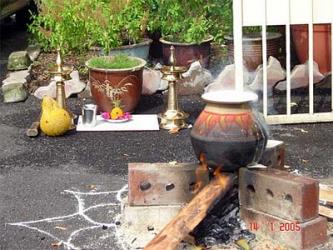Pongal

Pongal, also called Makara Sankranti, is a mid-January harvest festival
celebrated to give thanks for the rice harvest. Hindu people in India celebrate
this festival in honor of the Sun God, Surya, for a prosperous harvest.
The day before Pongal is known as Bogi Pandigai. On this day, people clean their
homes and light bonfires to discard unused items. In Punjab, the same day is
celebrated as Lohri by the Sikh community. On Pongal day, freshly harvested rice
is boiled with fresh milk and jaggery in a new clay pot.
While boiling the mixture, people let the milk spill over the pot, considering
it an auspicious sign of material abundance and prosperity. The resulting dish,
called Pongal, is a mixture of rice, milk, jaggery, and is topped with brown
sugar, ghee, cashew nuts, and raisins.
Freshly cooked Pongal is first offered to the Sun God as gratitude for a
bountiful harvest, and later served on banana leaves to those present for the
ceremony. Traditionally, Pongal is cooked at sunrise in an open place.
Pongal marks the first day of the Thai month according to the Tamil Solar
Calendar. Thai is the tenth solar month in the Tamil Calendar. Thai Masam is
known as Makar in other Hindu calendars.
The day following Thai Pongal is known as Mattu Pongal. Cattle are decorated and
worshipped on this day.
The final day of Pongal is known as Kaanum Pongal, a time for family reunions in
Tamil Nadu.
Pongal is celebrated with enthusiasm and fervor by the Indian community in
Malaysia. Malaysia is home to a significant Indian population, and Pongal holds
great religious and cultural importance for them.
undo Malaysian Festivals